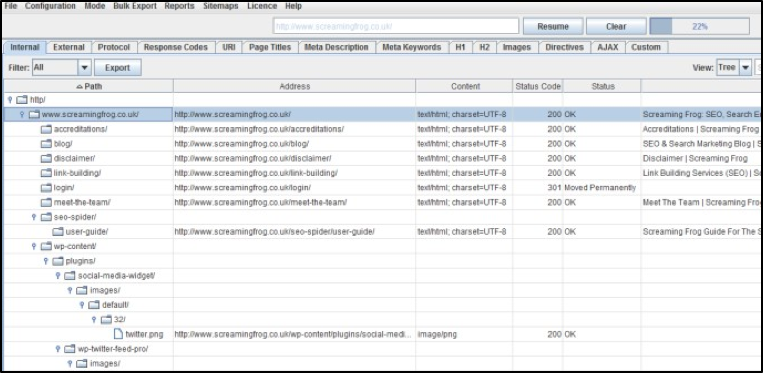Keyword cannibalization is a common issue that applies to all types of websites. To make matters worse, some marketers are not aware that their website might be facing a keyword cannibalization issue. Instead, marketers often look at a website on a page-by-page basis instead of the whole website when it comes to targeting keywords.
In fact, many websites face a keyword cannibalization issue because of historic content or a lack of a clear search strategy. It is important to identify and address a keyword cannibalization issue to maximize your search visibility and plan your future content creation.
Before explaining what keyword cannibalization is, it’s important to understand why this issue is relevant in the digital marketing industry. In today’s world, many websites are faced with historic content that still ranks for target terms. What is often forgotten is that that historic content can compete with new content being created, which leads to cannibalizing traffic or the keyword topics.
What is Keyword Cannibalization?
Keyword cannibalization is when your website has multiple pages that are mainly targeting the same core keyword and/or keyword topic. This situation often occurs due to CMS issues related to parameter pages, as well as, when the same keyword is intentionally used on multiple pages.
Unfortunately, keyword cannibalization is still occurring on multiple websites which can impact your search engine optimization (SEO) results as each page might compete with each other in search engine results pages (SERPs). There are multiple reasons why you would want to fix keyword cannibalization including:
- Diluting authority between pages: multiple pages with the same primary keyword topic can will make it more difficult for search engines to understand what the authoritative page is.
- Inefficient crawling and indexing of pages: Having multiple pages that are competing with each other makes search engines crawl pages that are not needed.
One of the biggest issues that keyword cannibalization causes is that search engines need to pick what the best page is for that keyword topic. In other words, that means that you are competing with yourself.
Hypothetical Keyword Cannibalization Example
To help explain keyword cannibalization example, let’s walk through a hypothetical example. This example will focus on the lack of a website’s internal structure and overall keyword targeting strategy.
For example, let’s say you have an eCommerce website that sells lacrosse equipment (selfish plug, as I coach lacrosse and the season just started). Most eCommerce websites use parameters to filter/sort products. For this example, our lacrosse store has a page for “lacrosse heads” that shows all the lacrosse heads that we sell. We might run into a keyword cannibalization issue if we have multiple parameter pages for each manufacturer of “lacrosse heads.”
In this example, our store might have a “lacrosse heads” page with the URL of www.lacrossestore.com/lacrosse-heads. Then on the page we options to select the manufacturer, which results in a new parameter page of www.lacrossestore.com/lacrosse-heads?brand=1. Essentially, that page would have the same title tag and keyword topic that could compete with the main www.lacrossestore.com/lacrosse-heads page. A search engine would have a difficult time understanding what page is the authoritative source for “lacrosse heads.” We also will be missing out on opportunities to rank for individual manufacturer pages related to the product.
How to Avoid Keyword Cannibalization
The first step to avoiding cannibalizing your keyword strategy is to use the map or audit the correct keywords to individual pages. You should have a general idea of what keywords are being targeted on each page of your website either when creating a website or auditing the existing pages. You can use Google Sheets or Excel to document the keyword strategy for each page to avoid targeting the same keyword on multiple pages.
The second step to avoiding keyword cannibalization is to use the right tools. You can use tools like Screaming Frog to analyze your website structure and any keyword commonalities in title tags, meta descriptions, heading tags, alt text, and other areas. When analyzing website structure, Screaming Frog can help visualize it with the “Tree” view (shown below). This view can make your life easier when seeing how your website is structured much more efficiently than looking at URLs.
You can also use the inlinks report within Screaming Frog to analyze your internal anchor text to target pages. By analyzing your anchor text to pages, you can make sure that you are using the correct keywords for each link to signal to search engines what the destination page is about.
Another helpful tool for avoiding keyword cannibalization is Siteliner. Siteliner is a fairly affordable option that checks your website for internal duplicate content. Internal duplicate content can be result in search engines not completely understanding what the page is actually about. Instead, focus on having one authoritative page for each keyword topic.
As we covered earlier, duplicate content can also result from content management system (CMS) issues. A CMS might use parameters to change the content for users, but the title tag and heading tags remain the same. When faced with a parameter issue, you have a couple options to resolve the issue.
The first option is to create static pages for parameter pages that have keyword topics with a good amount of search visibility. A static page will be easier to optimize for a specific keyword topic. Other options to resolve a parameter issue is to use Google Search Console to exclude the URL variations or use a canonical tag pointing to the original page.
Take a Stand Against Keyword Cannibalization
It is time to audit your website to make sure you avoid cannibalizing your search traffic. Not only does auditing your website for keyword cannibalization help avoid performance issues, but it can lead to discovering more opportunities for expanding your search footprint.
Let us know if you think your website has a keyword cannibalization issue so we can help you get the most search traffic as possible. We can help you leverage your analytical data to discover SEO opportunities for your website.
Gain a competitive advantage by subscribing to the
TopRank® Online Marketing Newsletter.
© Online Marketing Blog - TopRank®, 2017. | Is Keyword Cannibalization Hurting your SEO Performance? | http://www.toprankblog.com
The post Is Keyword Cannibalization Hurting your SEO Performance? appeared first on Online Marketing Blog - TopRank®.


No comments:
Post a Comment